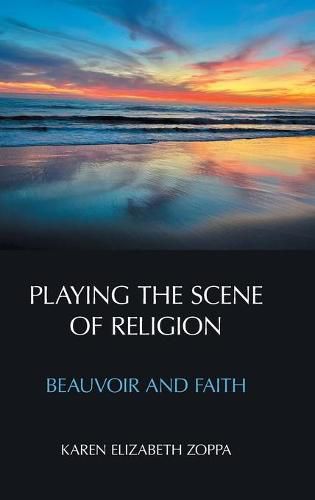Readings Newsletter
Become a Readings Member to make your shopping experience even easier.
Sign in or sign up for free!
You’re not far away from qualifying for FREE standard shipping within Australia
You’ve qualified for FREE standard shipping within Australia
The cart is loading…






This title is printed to order. This book may have been self-published. If so, we cannot guarantee the quality of the content. In the main most books will have gone through the editing process however some may not. We therefore suggest that you be aware of this before ordering this book. If in doubt check either the author or publisher’s details as we are unable to accept any returns unless they are faulty. Please contact us if you have any questions.
Simone de Beauvoir, one of the most famous existential philosophers of the 20th century, is a confirmed atheist. Despite this, she also engages and reassigns faith, that faith that is usually associated with ‘religion, ’ and iterates it in the service of her existential ethics. Beauvoir’s ethic is founded in the axiom that ‘I concern others, and they concern me. There we have an irreducible truth.’ From this assumption, she articulates the principles for living an ethical life which honours above all the freedom of the other in a world fraught with contingency and ambiguity. In so doing, she enjoins us to undertake our efforts in generosity and risk, in faith toward each other, because only by doing so can we achieve the transcendence given in the existential condition. In this movement, Beauvoir confirms and performs a different reading of religion: religion as the scene of the self and other, of the appeal and response, of the holy and the faithful, which constitutes the history of European civilization. Following a certain thread in the discourse on religion given in Jacques Derrida and Michel de Certeau, this study proposes a theoretical apparatus for ‘religion’ which offers a different appreciation of Beauvoir’s ethics. This study has two agendas: to interrogate popular notions of religion by reading it, out of Derrida and Certeau, as a signifier for a situated historical scene; and to show the existential philosophy of Beauvoir as a performance of that scene. In particular, it will show how the structure of relationships she presents in her ethics clearly reproduces the rhythms of the scene of religion. One of the implications of this reproduction is that existential philosophy can only emerge in the context of religion, and is necessarily an iteration of religion. The other implication is that we might reassess how we code the category ‘religion’ in our public and private discourse, with all the disruption that such a different coding might entail.
$9.00 standard shipping within Australia
FREE standard shipping within Australia for orders over $100.00
Express & International shipping calculated at checkout
This title is printed to order. This book may have been self-published. If so, we cannot guarantee the quality of the content. In the main most books will have gone through the editing process however some may not. We therefore suggest that you be aware of this before ordering this book. If in doubt check either the author or publisher’s details as we are unable to accept any returns unless they are faulty. Please contact us if you have any questions.
Simone de Beauvoir, one of the most famous existential philosophers of the 20th century, is a confirmed atheist. Despite this, she also engages and reassigns faith, that faith that is usually associated with ‘religion, ’ and iterates it in the service of her existential ethics. Beauvoir’s ethic is founded in the axiom that ‘I concern others, and they concern me. There we have an irreducible truth.’ From this assumption, she articulates the principles for living an ethical life which honours above all the freedom of the other in a world fraught with contingency and ambiguity. In so doing, she enjoins us to undertake our efforts in generosity and risk, in faith toward each other, because only by doing so can we achieve the transcendence given in the existential condition. In this movement, Beauvoir confirms and performs a different reading of religion: religion as the scene of the self and other, of the appeal and response, of the holy and the faithful, which constitutes the history of European civilization. Following a certain thread in the discourse on religion given in Jacques Derrida and Michel de Certeau, this study proposes a theoretical apparatus for ‘religion’ which offers a different appreciation of Beauvoir’s ethics. This study has two agendas: to interrogate popular notions of religion by reading it, out of Derrida and Certeau, as a signifier for a situated historical scene; and to show the existential philosophy of Beauvoir as a performance of that scene. In particular, it will show how the structure of relationships she presents in her ethics clearly reproduces the rhythms of the scene of religion. One of the implications of this reproduction is that existential philosophy can only emerge in the context of religion, and is necessarily an iteration of religion. The other implication is that we might reassess how we code the category ‘religion’ in our public and private discourse, with all the disruption that such a different coding might entail.